Brent Marchant's Blog, page 107
June 7, 2017
This Week in Movies with Meaning
Reviews of "Wonder Woman," "Tanna" and "Gleason" are all in the latest Movies with Meaning post on The Good Radio Network web site, available by clicking here.


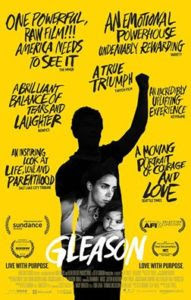





Published on June 07, 2017 14:27
June 1, 2017
‘Miss Sloane’ seeks to balance power and intent
“Miss Sloane” (2016). Cast: Jessica Chastain, Gugu Mbatha-Raw, John Lithgow, Sam Waterston, Michael Stuhlbarg, Alison Pill, Christine Baranski, Mark Strong, Jake Lacy, Chuck Shamata. Director: John Madden. Screenplay: Jonathan Perera. Web site. Trailer.
What does it take to push for a just cause? As much as we might like to think to the contrary, it often takes more than just good intentions; it frequently requires a concerted effort, one that may even include measures some of us would see as questionable, troubling or manipulative. Indeed, when it comes to achieving hoped-for outcomes in certain high-stakes issues, sometimes we may have to send a bulldog into the fight on our behalf. But where do we draw the line? How far are we willing to go when it comes to employing our personal power? Those are some of the issues raised and addressed in the gripping political drama, “Miss Sloane,” available on DVD, Blu-ray disk and video on demand.
Elizabeth Sloane (Jessica Chastain) is the best at what she does. As a high-powered Washington lobbyist, she’s as good as it gets when it comes to securing the results sought by her clients, some of whom clearly place their own interests above those of the public. She walks a fine line between what’s legal and what’s not, but she’s determined to get her way, all the while scrupulously insisting that everything she does is in accordance with the law.
Miss Sloane’s phenomenal success stems from her fanatical devotion to her work. She keeps a schedule that rarely includes sleep (she pops a barrage of pills to keep her going) and is almost entirely devoid of a personal life (except for occasional trysts with the best sex partner money can buy (Jake Lacy)). This may not be a lifestyle others would envy, but, if that’s what it takes to get the job done, she’s willing to do it.
 High-powered Washington lobbyist Elizabeth Sloane (Jessica Chastain) comes under scrutiny for her practices in the gripping political drama, “Miss Sloane.” Photo by Kerry Hayes © Europa Corp. – France 2 Cinema, courtesy Twentieth Century Fox Film Corporation.
High-powered Washington lobbyist Elizabeth Sloane (Jessica Chastain) comes under scrutiny for her practices in the gripping political drama, “Miss Sloane.” Photo by Kerry Hayes © Europa Corp. – France 2 Cinema, courtesy Twentieth Century Fox Film Corporation.
Meanwhile, because of her notable track record, Elizabeth’s boss, George Dupont (Sam Waterston), is favorably impressed with her work and increasingly steers big-name clients her way. She relishes the challenges and readily accepts them – that is, until George asks her to represent a constituency she finds personally objectionable: the gun lobby. It’s a proposal at which she draws a clearly defined line.
Elizabeth’s uncharacteristically flippant response to the proposal dumbfounds everyone, especially George, who has been trying to acquire the gun lobby account for some time. He’s outraged at her reaction, throwing her future with the firm into question. But, given Elizabeth’s reputation, it’s not long before another offer comes her way from a competing lobbying firm, one headed by Rodolfo Schmidt (Mark Strong), whose organization is more than willing to oppose the controversial initiatives put forth by the firearms community.
Miss Sloane agrees to Rodolfo’s offer, but she’s adamant that she have free rein to carry out her plan as she sees fit, a proposal to which he agrees, albeit somewhat hesitantly. She also convinces most of her staff to follow her to the new organization, the lone hold-out being her protégé, Jane Molloy (Alison Pill). Elizabeth is disappointed by Jane’s decision, but she wastes no time getting on with her plans, which include a number of her prototypical unconventional measures.
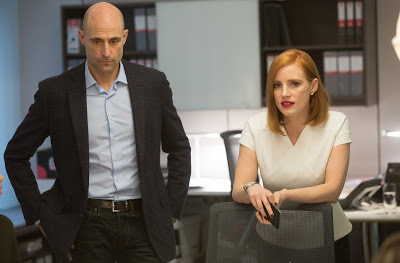 Successful Washington lobbyist Elizabeth Sloane (Jessica Chastain, right) confers with her boss, Rodolfo Schmidt (Mark Strong, left), about strategy in the gripping political drama, “Miss Sloane.” Photo by Kerry Hayes © Europa Corp. – France 2 Cinema, courtesy Twentieth Century Fox Film Corporation.
Successful Washington lobbyist Elizabeth Sloane (Jessica Chastain, right) confers with her boss, Rodolfo Schmidt (Mark Strong, left), about strategy in the gripping political drama, “Miss Sloane.” Photo by Kerry Hayes © Europa Corp. – France 2 Cinema, courtesy Twentieth Century Fox Film Corporation.
As the lobbying campaign unfolds, however, Elizabeth finds herself in deeper water than she’s accustomed to. She’s well aware that, if she succeeds in making her case, it will be the biggest triumph of her career. But, if she fails, it could mark the end of her days as a lobbyist. And so, to combat the most powerful forces she’s ever faced, she continually ups the ante, taking steps that stun her colleagues, such as trusted aide Esme Manucharian (Gugu Mbatha-Raw), as well as her boss and even herself.
How far will she go? Can she cope with the mounting criticisms of her tactics? What’s more, can she survive the growing onslaught of accusations being thrown at her, such as those raised by influential Congressman Ron Sperling (John Lithgow)? And is she even clear about why she’s doing what she’s doing – for the pursuit of a just cause or her own personal self-aggrandizement? In short, what does it all mean for her – and a public that’s to be seriously impacted by her efforts?
Those are questions that get answered as the film plays out, which is full of twists, turns and misdirections, many of which no one sees coming, even the spin mistress herself. It’s a thoroughly captivating story that grows progressively engaging the further you get into it, presenting the kind of edge-of-your-seat narrative that will keep you locked in place right up until the final credits roll.
At the heart of this story is the management of one’s personal power. This is an especially crucial concern when we make use of it through the conscious creation process, the means by which we manifest the reality we experience through our thoughts, beliefs and intents. As insubstantial as such intangible notions may seem, they’re not to be taken lightly; they possess phenomenal amounts of power capable of yielding equally impressive results once unleashed. They’re tools that we must treat with care and respect, tempering their use and management with a judicious eye and an ever-vigilant awareness of the responsibility associated with that.
Moreover, the greater the faith we place in these convictions, the stronger they’re likely to become, producing results commensurate with such enhanced potency. And, based on the outcomes Miss Sloane realizes, she’s quite obviously a master of faith in her beliefs, firmly entrenched in them and what they’re designed (and, in her case, destined) to achieve. This capacity can prove to be a real asset when it comes to envisioning and manifesting unconventional conceptions, the sort that have become Miss Sloane’s trademark.
 Washington lobbyist Elizabeth Sloane (Jessica Chastain, right) schools her protégé, Jane Molloy (Alison Pill, left), in the ways of the system in director John Madden’s latest offering, “Miss Sloane,” available on DVD, Blu-ray disk and video on demand. Photo by Kerry Hayes © Europa Corp. – France 2 Cinema, courtesy Twentieth Century Fox Film Corporation.
Washington lobbyist Elizabeth Sloane (Jessica Chastain, right) schools her protégé, Jane Molloy (Alison Pill, left), in the ways of the system in director John Madden’s latest offering, “Miss Sloane,” available on DVD, Blu-ray disk and video on demand. Photo by Kerry Hayes © Europa Corp. – France 2 Cinema, courtesy Twentieth Century Fox Film Corporation.
But, given the lengths to which she’s willing to go, is Elizabeth taking things too far? Is she so singularly focused that she loses sight of the potential fallout that comes from her beliefs and actions? Does she slip into the practice of un-conscious creation, whereby a belief in results at all costs trumps all other considerations? What’s more, in light of her all-encompassing determination, isn’t it possible that she runs the risk of running roughshod over her divine conscious creation collaborator (“pushing the Universe” as it’s sometimes called), leaving herself open to all manner of backlash?
Like all of us, these are considerations Elizabeth seriously needs to address. This requires us to take stock of our beliefs, assessing them honestly in terms of what they’re meant to achieve. But that also demands that we get clear with ourselves. For instance, are our motivations governed by service to others or service to self? Are we employing means that are wholly ethical, or are we skirting the rim of illegality or immorality, to attain the goal we seek? Can we legitimately justify our intents, or are we backing into rationalizations of questionable authenticity? And, perhaps most importantly, are our proposed efforts benign, or will others be negatively impacted? If we verge into suspect territory in any of these regards, we may need to step back and reconsider what we’re doing. No cause, no matter how noble, can be justified by thoughts, beliefs and intents that lack integrity and carry the potential to unduly inflict harm.
“Miss Sloane” received comparatively little fanfare when it was released last December. It somehow got lost in the shuffle of all the awards season releases, somewhat unusual for a film with a major distributor behind it. Still, director John Madden’s latest received favorable critical acclaim, as well as a very well-deserved Golden Globe Award nomination for best lead actress in a drama, just one of many fine performances in the film.
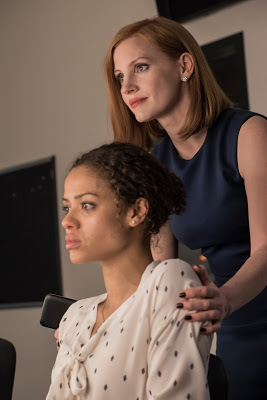 High-powered Washington lobbyist Elizabeth Sloane (Jessica Chastain, right) places her faith in the support of her entrusted aide, Esme Manucharian (Gugu Mbatha-Raw, left), in “Miss Sloane.” Photo by Kerry Hayes © Europa Corp. – France 2 Cinema, courtesy Twentieth Century Fox Film Corporation.
High-powered Washington lobbyist Elizabeth Sloane (Jessica Chastain, right) places her faith in the support of her entrusted aide, Esme Manucharian (Gugu Mbatha-Raw, left), in “Miss Sloane.” Photo by Kerry Hayes © Europa Corp. – France 2 Cinema, courtesy Twentieth Century Fox Film Corporation.
Some have criticized the story as implausible and unrealistic, that no lobbying effort would ever collectively incorporate so many extreme measures and incidents as are included here. However, that’s not to say that the events and initiatives depicted in this story haven’t occurred individually in connection with separate issues at one time or another. In that regard, then, the film gives us a frank look into what goes on behind the scenes in connection with high-profile lobbying efforts, what it takes to secure results and what that means for all of us who typically watch from the sidelines. Realizing that, it also shows us what we need to know about how these matters work – and what we might consider doing to help fix the system.
Seeking to sway others of the merits of a cause requires convincing arguments, commitment and an unwavering passion. But how much is too much? “Miss Sloane” helps to shed light on that for us. Let’s just hope we’re all paying attention.
Copyright © 2017, by Brent Marchant. All rights reserved.
What does it take to push for a just cause? As much as we might like to think to the contrary, it often takes more than just good intentions; it frequently requires a concerted effort, one that may even include measures some of us would see as questionable, troubling or manipulative. Indeed, when it comes to achieving hoped-for outcomes in certain high-stakes issues, sometimes we may have to send a bulldog into the fight on our behalf. But where do we draw the line? How far are we willing to go when it comes to employing our personal power? Those are some of the issues raised and addressed in the gripping political drama, “Miss Sloane,” available on DVD, Blu-ray disk and video on demand.
Elizabeth Sloane (Jessica Chastain) is the best at what she does. As a high-powered Washington lobbyist, she’s as good as it gets when it comes to securing the results sought by her clients, some of whom clearly place their own interests above those of the public. She walks a fine line between what’s legal and what’s not, but she’s determined to get her way, all the while scrupulously insisting that everything she does is in accordance with the law.
Miss Sloane’s phenomenal success stems from her fanatical devotion to her work. She keeps a schedule that rarely includes sleep (she pops a barrage of pills to keep her going) and is almost entirely devoid of a personal life (except for occasional trysts with the best sex partner money can buy (Jake Lacy)). This may not be a lifestyle others would envy, but, if that’s what it takes to get the job done, she’s willing to do it.
 High-powered Washington lobbyist Elizabeth Sloane (Jessica Chastain) comes under scrutiny for her practices in the gripping political drama, “Miss Sloane.” Photo by Kerry Hayes © Europa Corp. – France 2 Cinema, courtesy Twentieth Century Fox Film Corporation.
High-powered Washington lobbyist Elizabeth Sloane (Jessica Chastain) comes under scrutiny for her practices in the gripping political drama, “Miss Sloane.” Photo by Kerry Hayes © Europa Corp. – France 2 Cinema, courtesy Twentieth Century Fox Film Corporation.Meanwhile, because of her notable track record, Elizabeth’s boss, George Dupont (Sam Waterston), is favorably impressed with her work and increasingly steers big-name clients her way. She relishes the challenges and readily accepts them – that is, until George asks her to represent a constituency she finds personally objectionable: the gun lobby. It’s a proposal at which she draws a clearly defined line.
Elizabeth’s uncharacteristically flippant response to the proposal dumbfounds everyone, especially George, who has been trying to acquire the gun lobby account for some time. He’s outraged at her reaction, throwing her future with the firm into question. But, given Elizabeth’s reputation, it’s not long before another offer comes her way from a competing lobbying firm, one headed by Rodolfo Schmidt (Mark Strong), whose organization is more than willing to oppose the controversial initiatives put forth by the firearms community.
Miss Sloane agrees to Rodolfo’s offer, but she’s adamant that she have free rein to carry out her plan as she sees fit, a proposal to which he agrees, albeit somewhat hesitantly. She also convinces most of her staff to follow her to the new organization, the lone hold-out being her protégé, Jane Molloy (Alison Pill). Elizabeth is disappointed by Jane’s decision, but she wastes no time getting on with her plans, which include a number of her prototypical unconventional measures.
 Successful Washington lobbyist Elizabeth Sloane (Jessica Chastain, right) confers with her boss, Rodolfo Schmidt (Mark Strong, left), about strategy in the gripping political drama, “Miss Sloane.” Photo by Kerry Hayes © Europa Corp. – France 2 Cinema, courtesy Twentieth Century Fox Film Corporation.
Successful Washington lobbyist Elizabeth Sloane (Jessica Chastain, right) confers with her boss, Rodolfo Schmidt (Mark Strong, left), about strategy in the gripping political drama, “Miss Sloane.” Photo by Kerry Hayes © Europa Corp. – France 2 Cinema, courtesy Twentieth Century Fox Film Corporation.As the lobbying campaign unfolds, however, Elizabeth finds herself in deeper water than she’s accustomed to. She’s well aware that, if she succeeds in making her case, it will be the biggest triumph of her career. But, if she fails, it could mark the end of her days as a lobbyist. And so, to combat the most powerful forces she’s ever faced, she continually ups the ante, taking steps that stun her colleagues, such as trusted aide Esme Manucharian (Gugu Mbatha-Raw), as well as her boss and even herself.
How far will she go? Can she cope with the mounting criticisms of her tactics? What’s more, can she survive the growing onslaught of accusations being thrown at her, such as those raised by influential Congressman Ron Sperling (John Lithgow)? And is she even clear about why she’s doing what she’s doing – for the pursuit of a just cause or her own personal self-aggrandizement? In short, what does it all mean for her – and a public that’s to be seriously impacted by her efforts?
Those are questions that get answered as the film plays out, which is full of twists, turns and misdirections, many of which no one sees coming, even the spin mistress herself. It’s a thoroughly captivating story that grows progressively engaging the further you get into it, presenting the kind of edge-of-your-seat narrative that will keep you locked in place right up until the final credits roll.
At the heart of this story is the management of one’s personal power. This is an especially crucial concern when we make use of it through the conscious creation process, the means by which we manifest the reality we experience through our thoughts, beliefs and intents. As insubstantial as such intangible notions may seem, they’re not to be taken lightly; they possess phenomenal amounts of power capable of yielding equally impressive results once unleashed. They’re tools that we must treat with care and respect, tempering their use and management with a judicious eye and an ever-vigilant awareness of the responsibility associated with that.
Moreover, the greater the faith we place in these convictions, the stronger they’re likely to become, producing results commensurate with such enhanced potency. And, based on the outcomes Miss Sloane realizes, she’s quite obviously a master of faith in her beliefs, firmly entrenched in them and what they’re designed (and, in her case, destined) to achieve. This capacity can prove to be a real asset when it comes to envisioning and manifesting unconventional conceptions, the sort that have become Miss Sloane’s trademark.
 Washington lobbyist Elizabeth Sloane (Jessica Chastain, right) schools her protégé, Jane Molloy (Alison Pill, left), in the ways of the system in director John Madden’s latest offering, “Miss Sloane,” available on DVD, Blu-ray disk and video on demand. Photo by Kerry Hayes © Europa Corp. – France 2 Cinema, courtesy Twentieth Century Fox Film Corporation.
Washington lobbyist Elizabeth Sloane (Jessica Chastain, right) schools her protégé, Jane Molloy (Alison Pill, left), in the ways of the system in director John Madden’s latest offering, “Miss Sloane,” available on DVD, Blu-ray disk and video on demand. Photo by Kerry Hayes © Europa Corp. – France 2 Cinema, courtesy Twentieth Century Fox Film Corporation.But, given the lengths to which she’s willing to go, is Elizabeth taking things too far? Is she so singularly focused that she loses sight of the potential fallout that comes from her beliefs and actions? Does she slip into the practice of un-conscious creation, whereby a belief in results at all costs trumps all other considerations? What’s more, in light of her all-encompassing determination, isn’t it possible that she runs the risk of running roughshod over her divine conscious creation collaborator (“pushing the Universe” as it’s sometimes called), leaving herself open to all manner of backlash?
Like all of us, these are considerations Elizabeth seriously needs to address. This requires us to take stock of our beliefs, assessing them honestly in terms of what they’re meant to achieve. But that also demands that we get clear with ourselves. For instance, are our motivations governed by service to others or service to self? Are we employing means that are wholly ethical, or are we skirting the rim of illegality or immorality, to attain the goal we seek? Can we legitimately justify our intents, or are we backing into rationalizations of questionable authenticity? And, perhaps most importantly, are our proposed efforts benign, or will others be negatively impacted? If we verge into suspect territory in any of these regards, we may need to step back and reconsider what we’re doing. No cause, no matter how noble, can be justified by thoughts, beliefs and intents that lack integrity and carry the potential to unduly inflict harm.
“Miss Sloane” received comparatively little fanfare when it was released last December. It somehow got lost in the shuffle of all the awards season releases, somewhat unusual for a film with a major distributor behind it. Still, director John Madden’s latest received favorable critical acclaim, as well as a very well-deserved Golden Globe Award nomination for best lead actress in a drama, just one of many fine performances in the film.
 High-powered Washington lobbyist Elizabeth Sloane (Jessica Chastain, right) places her faith in the support of her entrusted aide, Esme Manucharian (Gugu Mbatha-Raw, left), in “Miss Sloane.” Photo by Kerry Hayes © Europa Corp. – France 2 Cinema, courtesy Twentieth Century Fox Film Corporation.
High-powered Washington lobbyist Elizabeth Sloane (Jessica Chastain, right) places her faith in the support of her entrusted aide, Esme Manucharian (Gugu Mbatha-Raw, left), in “Miss Sloane.” Photo by Kerry Hayes © Europa Corp. – France 2 Cinema, courtesy Twentieth Century Fox Film Corporation.Some have criticized the story as implausible and unrealistic, that no lobbying effort would ever collectively incorporate so many extreme measures and incidents as are included here. However, that’s not to say that the events and initiatives depicted in this story haven’t occurred individually in connection with separate issues at one time or another. In that regard, then, the film gives us a frank look into what goes on behind the scenes in connection with high-profile lobbying efforts, what it takes to secure results and what that means for all of us who typically watch from the sidelines. Realizing that, it also shows us what we need to know about how these matters work – and what we might consider doing to help fix the system.
Seeking to sway others of the merits of a cause requires convincing arguments, commitment and an unwavering passion. But how much is too much? “Miss Sloane” helps to shed light on that for us. Let’s just hope we’re all paying attention.
Copyright © 2017, by Brent Marchant. All rights reserved.
Published on June 01, 2017 02:16
May 31, 2017
On the Radio This Week
Join me and host Frankie Picasso for the next edition of Frankiesense & More radio when we'll interview director Betsy Kalin about her latest documentary, "East LA Interchange." We'll also discuss some new movie releases in theaters and for home viewing. Tune in here Thursday, June 1 at 1 pm ET for some lively movie chat. And to find out more about "East LA Interchange," click here.






Published on May 31, 2017 15:14
This Week in Movies with Meaning
Reviews of "One Week and a Day" and "Miss Sloane" and a radio show preview are all in the latest Movies with Meaning post on The Good Radio Network, available by clicking here.
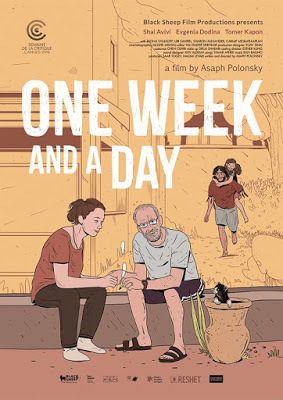







Published on May 31, 2017 02:51
April 26, 2017
On the Radio This Week
Join host Frankie Picasso and me this Thursday, April 27, at 1 pm ET for the next Movies with Meaning segment on Frankiesense & More radio. We’ll talk about several current film releases and other movie news. Tune in live or listen to the on-demand podcast for some lively movie talk by clicking here.


Published on April 26, 2017 16:00
April 23, 2017
This Week in Movies with Meaning
Reviews of "Donnie Darko" and "Youth" and a radio show preview are all in the latest Movies with Meaning post on the web page of The Good Radio Network, available by clicking here.
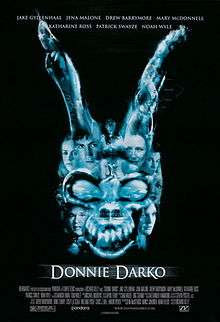
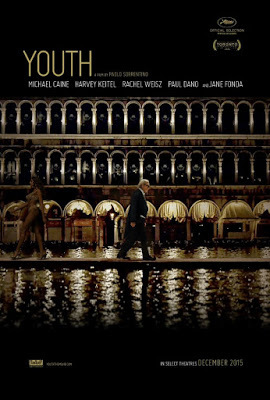






Published on April 23, 2017 14:41
April 19, 2017
‘Colossal’ exposes the beauty – and the beast – of the inner self
“Colossal” (2017). Cast: Anne Hathaway, Jason Sudeikis, Austin Stowell, Tim Blake Nelson, Dan Stevens, Hannah Cheramy, Nathan Ellison, Sarah Surh, Haeun Hannah Cho. Director: Nacho Vigalondo. Screenplay: Nacho Vigalondo. Web site. Trailer.
Ever feel like you’ve unwittingly projected something of yourself out onto the world? That might not be so bad if it’s something benevolent. But what if it’s resulted in something positively monstrous? That’s the uncomfortable realization faced by a shocked young protagonist in the new sci-fi comedy, “Colossal.”
Transplanted Gothamite Gloria (Anne Hathaway) faces a number of challenges. As an online writer who’s been unemployed for a year, she’s virtually given up on looking for work, spending most of her time going out and drinking with friends, a pastime she’s begun to enjoy a little too much. These are habits not lost on her boyfriend, Tim (Dan Stevens), who has grown tired of her irresponsible behavior. In fact, he’s become so fed up with her partying and laziness that he’s unwilling to let Gloria sponge off of him any longer, so he packs her bags while on one of her nightly binges, informing her upon her return that he wants her to move out.
With no money and nowhere else to go, Gloria reluctantly returns to her sleepy hometown, moving into her vacant family home to try and figure out what’s next. Not long after arriving, she has a chance encounter with Oscar (Jason Sudeikis), an old grade school friend who stayed in town and took over the family business, a popular local night spot. He invites Gloria to hang out with him at the bar and, after hearing her story, proceeds to offer her a job as a waitress. The prospects of a steady income (and a ready source of alcohol) appeal to her, so she gladly accepts Oscar’s offer.
Given everything that’s been transpiring in her own topsy-turvy world, Gloria has paid little attention to what’s been happening in the world at large. That changes, however, when she hears about a shocking incident in Seoul, South Korea, where a giant Godzilla-like monster has begun terrorizing the city. She’s stunned by the graphic video images of devastation blanketing the Internet and cable TV. But that’s nothing compared to what comes next, an even more astounding realization that sends shudders down to her bones: While watching the latest footage of events halfway around the globe, Gloria notices an uncanny synchronization between her movements and those of the monster. And, when she puts this theory to the test by trying out specific gestures, she finds the creature matching her move for move. In short, Gloria comes to realize that, in some strange way, she’s the monster, with her scaly Korean counterpart mimicking each and every action.
One might ask, “How is this possible?” Considering her recent behavior, one could say that the monster is a projection of Gloria’s inner self. And, when she sees the damage that “she” has inflicted, she’s genuinely distraught, looking for ways to somehow make amends. So, after some further investigation and experimentation, she finds she can manipulate the creature’s behavior, intentionally changing it for the better. However, that doesn’t eliminate all of the problems Seoul experiences, and it leaves open an important question: Why did any of this happen in the first place?
As Gloria seeks to take responsibility for her actions and those of her reptilian doppelganger, she starts to clean up her act, giving up drinking and seriously contemplating her future. She even begins taking an interest in a potential new romantic prospect, Joel (Austin Stowell), one of the regulars at the bar. But, as Gloria implements these changes, she also notices that Oscar begins behaving oddly, especially after she lets him in on her little secret. These developments lead to the emergence of some extremely puzzling (and exceedingly ugly) behavior on his part, actions that appear to have roots that stem all the way back to their childhood, clues to which Gloria discovers through a series of unsettling flashback recollections.
With external circumstances continuing to deteriorate, both at home and in Korea, Gloria soon realizes she needs to address these issues. She clearly needs to take steps to deal with Oscar’s increasingly intimidating behavior, as well as measures to save her soul (or is it Seoul?), before matters really get out of hand. Just as she summoned the monster from within her being, she must now bring forth other elements of her inner self to sort out the challenges in her life. It’s an experience that teaches her what it means to take charge of her life and the responsibility that accompanies it, an action with potentially “colossal” consequences.
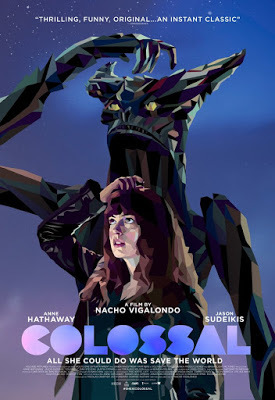
Throughout the ages, countless visionaries, from philosophers to prophets to motivational speakers, have asserted that we each shape our own destiny, that the world before our eyes is a reflection of who we are on the inside, that our external reality is a projection that springs forth from within us. If this sounds familiar, it should, since this is the same basic principle that underlies the conscious creation process, the means by which we manifest the existence we experience through the power of our thoughts, beliefs and intents. And no matter what arises, it’s always an authentic representation of those notions, regardless of how beautiful or repulsive it might be, a realization that could either please us or shock us to our core, depending on the specifics of what emerges.
In light of what’s been unfolding in Gloria’s life of late, with all of her out-of-control drinking and unwillingness to pull her own weight, one could readily contend that her behavior has been rather “beastly,” and this symbolically manifests through her treacherous towering twin. She’s initially shocked at the footage of the creature wreaking havoc in the streets, unaware of her role in said events. However, once she grasps the relationship between her own antics and those of the monster, it gives her pause to reflect on what’s happened – and why.
With such revelatory insights now percolating through her consciousness, Gloria has an opportunity to change her beliefs – and her life. She begins retooling her intentions to bring about a better reality, one characterized by more civil behavior and an attitude of benevolence toward others across the board. But, in doing this, she must first unwind the beliefs that got her into trouble.
For example, when Gloria leaves New York, she’s clearly on a downward spiral, one that could continue to get further out of hand if left unchecked. As noted previously, one could even say that her very soul is at stake. Her inner beast is being allowed to run amok, and now it’s ready to match wits with that vulnerable soul, a scenario symbolically reflected in the creature’s appearance and, all puns aside, its uncannily ironic choice of cities to terrorize. Gloria is suitably appalled at the events unfolding in Korea, and their impact and meaning get driven home when she realizes that she’s the one causing them. But, in spite of her newfound awareness, the question remains, why is she manifesting this?
As a result of this new understanding, Gloria sets in motion plans to turn her life around. However, to succeed at this, she must come to some additional realizations. For instance, like many who struggle with emerging or full-blown addictions, this budding alcoholic must hit bottom first, and, to that end, she’s manifested the circumstances to help make that possible. By taking a job in a fully stocked bar with an enabling boss who never passes up an opportunity to imbibe with his drinking buddies (Gloria included), she provides herself with the environment and resources to address these circumstances – to either immerse herself in her addiction or to become so thoroughly repulsed by it that it prompts her to abandon it and strike out in a new direction. Considering the changes she starts to make, she seems to be getting the message and proceeds to rewrite her beliefs accordingly, giving herself a shot at a new beginning.
But, even with that enlightened perspective, if Gloria wants complete resolution of this situation, she still needs to understand the roots of this drama. And, again, her external world provides clues about this, with elements reflective of her internal state of mind.
One such element is Oscar. Although at times quite charming, he’s actually a bully at heart, one who has no qualms about intimidating others or lashing out at the world when it suits his needs. And, as unlikely as it might seem, in many ways, he’s another reflection of Gloria’s inner self, one not unlike her unleashed beast, a creature that also intimidates others and lashes out violently at will. Because of this, Oscar very much represents what Gloria could become if she doesn’t get the monstrous aspects of her being under control.
In light of this, Gloria must ask herself, why would she harbor beliefs that have led to such destructive behavior, both per se and in its symbolic manifestations? What would prompt her to formulate intents that could lead to her potentially becoming a bully in her own right? But, perhaps more importantly, is it possible that the anguish associated with unpleasant past experiences has led to her feelings of disempowerment and her descent into addiction? Answering these questions may well prove invaluable in helping Gloria satisfactorily resolve her circumstances once and for all.
The development of bullying behavior (and the beliefs that spawn it) often arise when someone is abused or oppressed by others. Manifesting beliefs form whereby the victim becomes the victimizer. Unfortunately, until one comes to understand this, the source of the original abuse or oppression is rarely the target of the retribution, and innocents caught in the crossfire frequently suffer the effects of such fallout, as the citizens of Seoul in this scenario can readily attest.
Given that, then, Gloria needs to understand what prompted the emergence of her recent behavior. Could it be that she was a bullying victim who now seeks to work through her anger and frustration by taking on the traits of those who once abused her? And, if so, can she alter her beliefs accordingly, say, to pinpoint the target of the comeuppance she seeks to dole out? Or will she recklessly dispense revenge in a haphazard, scatter-shot fashion, irresponsibly distributing it, as the monster does, toward those regrettably in the wrong place at the wrong time?
This is the challenge Gloria must work through. It appears to be something she’s put off dealing with for quite some time, one with life-long implications, as seen in her flashback recollections with Oscar, as well as in certain aspects of her recent relationship with Tim. Elements of victimization are present in both of these situations, so one could readily argue that it’s understandable she might unwittingly turn to unhealthy coping mechanisms like drinking or bullying to deaden the pain and survive. Indeed, if Gloria’s to fix this aspect of her life once and for all, she must not only deal with its source, but also take steps to prevent it from happening again. And she must do so in a way where she addresses her own well-being and where her payback is properly directed, sparing the uninvolved from unintended effects.
Should Gloria do this, she stands a chance to truly set herself on a productive and fulfilling new path, one free of the baggage that’s been holding her down. She’ll be able to conquer the demons that have been hindering her progress and causing her to unwittingly inflict harm on herself and others. That’s a colossal step forward, one that can be brought about simply by taking a look inside to see what’s there and why. Such a new understanding can work wonders – and in myriad ways.
It’s truly heartening to see an empowered woman like Gloria taking charge of her life. But this film is by no means a radical feminist manifesto. Rather, it’s an inspiring tale meant to bring the best out of anyone who grapples with issues of victimization, addiction and disempowerment, presenting viable options to address these challenges in a healthy, proactive way. (And who says we can’t learn valuable life lessons from the adventures of a hideous gigantic sea monster?)
Writer-director Nacho Vigalondo’s latest offering is truly one of the most unusual releases to come along in quite some time. On the surface, it’s part comedy, part campy sci-fi monster movie. But, beneath the surface, “Colossal” is an inventive, deceptively profound metaphysical fantasy about how our innermost thoughts spring into physical existence, offering us a tangible glimpse of true selves – if we only have the courage to look at it. The film’s excellent performances (especially Hathaway) bring the characters to life, enlivening the picture’s quirky yet thought-provoking narrative, and its surprisingly good special effects successfully resist the temptation to descend into the realm of the cheesy. Despite a handful of somewhat contrived, drawn-out soliloquies (delivered by Sudeikis in an often-annoying monotone) and a slight tendency to meander in the opening 30 minutes, “Colossal” succeeds beautifully in virtually every other regard, offering audiences a unique viewing experience, one that’s likely to become a cult classic.
Those schooled in conscious creation are no doubt familiar with the notion that energy flows where thoughts go, something that can yield decidedly tangible results, as Gloria’s experience poignantly shows. That’s true for all of life’s manifestations, too, no matter what the scope, venue or genre of materialization. In light of that, then, it’s important that we pay attention to what we bring into being; after all, you never know who or what may depend on it.
Copyright © 2017, by Brent Marchant. All rights reserved.
Ever feel like you’ve unwittingly projected something of yourself out onto the world? That might not be so bad if it’s something benevolent. But what if it’s resulted in something positively monstrous? That’s the uncomfortable realization faced by a shocked young protagonist in the new sci-fi comedy, “Colossal.”
Transplanted Gothamite Gloria (Anne Hathaway) faces a number of challenges. As an online writer who’s been unemployed for a year, she’s virtually given up on looking for work, spending most of her time going out and drinking with friends, a pastime she’s begun to enjoy a little too much. These are habits not lost on her boyfriend, Tim (Dan Stevens), who has grown tired of her irresponsible behavior. In fact, he’s become so fed up with her partying and laziness that he’s unwilling to let Gloria sponge off of him any longer, so he packs her bags while on one of her nightly binges, informing her upon her return that he wants her to move out.
With no money and nowhere else to go, Gloria reluctantly returns to her sleepy hometown, moving into her vacant family home to try and figure out what’s next. Not long after arriving, she has a chance encounter with Oscar (Jason Sudeikis), an old grade school friend who stayed in town and took over the family business, a popular local night spot. He invites Gloria to hang out with him at the bar and, after hearing her story, proceeds to offer her a job as a waitress. The prospects of a steady income (and a ready source of alcohol) appeal to her, so she gladly accepts Oscar’s offer.
Given everything that’s been transpiring in her own topsy-turvy world, Gloria has paid little attention to what’s been happening in the world at large. That changes, however, when she hears about a shocking incident in Seoul, South Korea, where a giant Godzilla-like monster has begun terrorizing the city. She’s stunned by the graphic video images of devastation blanketing the Internet and cable TV. But that’s nothing compared to what comes next, an even more astounding realization that sends shudders down to her bones: While watching the latest footage of events halfway around the globe, Gloria notices an uncanny synchronization between her movements and those of the monster. And, when she puts this theory to the test by trying out specific gestures, she finds the creature matching her move for move. In short, Gloria comes to realize that, in some strange way, she’s the monster, with her scaly Korean counterpart mimicking each and every action.
One might ask, “How is this possible?” Considering her recent behavior, one could say that the monster is a projection of Gloria’s inner self. And, when she sees the damage that “she” has inflicted, she’s genuinely distraught, looking for ways to somehow make amends. So, after some further investigation and experimentation, she finds she can manipulate the creature’s behavior, intentionally changing it for the better. However, that doesn’t eliminate all of the problems Seoul experiences, and it leaves open an important question: Why did any of this happen in the first place?
As Gloria seeks to take responsibility for her actions and those of her reptilian doppelganger, she starts to clean up her act, giving up drinking and seriously contemplating her future. She even begins taking an interest in a potential new romantic prospect, Joel (Austin Stowell), one of the regulars at the bar. But, as Gloria implements these changes, she also notices that Oscar begins behaving oddly, especially after she lets him in on her little secret. These developments lead to the emergence of some extremely puzzling (and exceedingly ugly) behavior on his part, actions that appear to have roots that stem all the way back to their childhood, clues to which Gloria discovers through a series of unsettling flashback recollections.
With external circumstances continuing to deteriorate, both at home and in Korea, Gloria soon realizes she needs to address these issues. She clearly needs to take steps to deal with Oscar’s increasingly intimidating behavior, as well as measures to save her soul (or is it Seoul?), before matters really get out of hand. Just as she summoned the monster from within her being, she must now bring forth other elements of her inner self to sort out the challenges in her life. It’s an experience that teaches her what it means to take charge of her life and the responsibility that accompanies it, an action with potentially “colossal” consequences.

Throughout the ages, countless visionaries, from philosophers to prophets to motivational speakers, have asserted that we each shape our own destiny, that the world before our eyes is a reflection of who we are on the inside, that our external reality is a projection that springs forth from within us. If this sounds familiar, it should, since this is the same basic principle that underlies the conscious creation process, the means by which we manifest the existence we experience through the power of our thoughts, beliefs and intents. And no matter what arises, it’s always an authentic representation of those notions, regardless of how beautiful or repulsive it might be, a realization that could either please us or shock us to our core, depending on the specifics of what emerges.
In light of what’s been unfolding in Gloria’s life of late, with all of her out-of-control drinking and unwillingness to pull her own weight, one could readily contend that her behavior has been rather “beastly,” and this symbolically manifests through her treacherous towering twin. She’s initially shocked at the footage of the creature wreaking havoc in the streets, unaware of her role in said events. However, once she grasps the relationship between her own antics and those of the monster, it gives her pause to reflect on what’s happened – and why.
With such revelatory insights now percolating through her consciousness, Gloria has an opportunity to change her beliefs – and her life. She begins retooling her intentions to bring about a better reality, one characterized by more civil behavior and an attitude of benevolence toward others across the board. But, in doing this, she must first unwind the beliefs that got her into trouble.
For example, when Gloria leaves New York, she’s clearly on a downward spiral, one that could continue to get further out of hand if left unchecked. As noted previously, one could even say that her very soul is at stake. Her inner beast is being allowed to run amok, and now it’s ready to match wits with that vulnerable soul, a scenario symbolically reflected in the creature’s appearance and, all puns aside, its uncannily ironic choice of cities to terrorize. Gloria is suitably appalled at the events unfolding in Korea, and their impact and meaning get driven home when she realizes that she’s the one causing them. But, in spite of her newfound awareness, the question remains, why is she manifesting this?
As a result of this new understanding, Gloria sets in motion plans to turn her life around. However, to succeed at this, she must come to some additional realizations. For instance, like many who struggle with emerging or full-blown addictions, this budding alcoholic must hit bottom first, and, to that end, she’s manifested the circumstances to help make that possible. By taking a job in a fully stocked bar with an enabling boss who never passes up an opportunity to imbibe with his drinking buddies (Gloria included), she provides herself with the environment and resources to address these circumstances – to either immerse herself in her addiction or to become so thoroughly repulsed by it that it prompts her to abandon it and strike out in a new direction. Considering the changes she starts to make, she seems to be getting the message and proceeds to rewrite her beliefs accordingly, giving herself a shot at a new beginning.
But, even with that enlightened perspective, if Gloria wants complete resolution of this situation, she still needs to understand the roots of this drama. And, again, her external world provides clues about this, with elements reflective of her internal state of mind.
One such element is Oscar. Although at times quite charming, he’s actually a bully at heart, one who has no qualms about intimidating others or lashing out at the world when it suits his needs. And, as unlikely as it might seem, in many ways, he’s another reflection of Gloria’s inner self, one not unlike her unleashed beast, a creature that also intimidates others and lashes out violently at will. Because of this, Oscar very much represents what Gloria could become if she doesn’t get the monstrous aspects of her being under control.
In light of this, Gloria must ask herself, why would she harbor beliefs that have led to such destructive behavior, both per se and in its symbolic manifestations? What would prompt her to formulate intents that could lead to her potentially becoming a bully in her own right? But, perhaps more importantly, is it possible that the anguish associated with unpleasant past experiences has led to her feelings of disempowerment and her descent into addiction? Answering these questions may well prove invaluable in helping Gloria satisfactorily resolve her circumstances once and for all.
The development of bullying behavior (and the beliefs that spawn it) often arise when someone is abused or oppressed by others. Manifesting beliefs form whereby the victim becomes the victimizer. Unfortunately, until one comes to understand this, the source of the original abuse or oppression is rarely the target of the retribution, and innocents caught in the crossfire frequently suffer the effects of such fallout, as the citizens of Seoul in this scenario can readily attest.
Given that, then, Gloria needs to understand what prompted the emergence of her recent behavior. Could it be that she was a bullying victim who now seeks to work through her anger and frustration by taking on the traits of those who once abused her? And, if so, can she alter her beliefs accordingly, say, to pinpoint the target of the comeuppance she seeks to dole out? Or will she recklessly dispense revenge in a haphazard, scatter-shot fashion, irresponsibly distributing it, as the monster does, toward those regrettably in the wrong place at the wrong time?
This is the challenge Gloria must work through. It appears to be something she’s put off dealing with for quite some time, one with life-long implications, as seen in her flashback recollections with Oscar, as well as in certain aspects of her recent relationship with Tim. Elements of victimization are present in both of these situations, so one could readily argue that it’s understandable she might unwittingly turn to unhealthy coping mechanisms like drinking or bullying to deaden the pain and survive. Indeed, if Gloria’s to fix this aspect of her life once and for all, she must not only deal with its source, but also take steps to prevent it from happening again. And she must do so in a way where she addresses her own well-being and where her payback is properly directed, sparing the uninvolved from unintended effects.
Should Gloria do this, she stands a chance to truly set herself on a productive and fulfilling new path, one free of the baggage that’s been holding her down. She’ll be able to conquer the demons that have been hindering her progress and causing her to unwittingly inflict harm on herself and others. That’s a colossal step forward, one that can be brought about simply by taking a look inside to see what’s there and why. Such a new understanding can work wonders – and in myriad ways.
It’s truly heartening to see an empowered woman like Gloria taking charge of her life. But this film is by no means a radical feminist manifesto. Rather, it’s an inspiring tale meant to bring the best out of anyone who grapples with issues of victimization, addiction and disempowerment, presenting viable options to address these challenges in a healthy, proactive way. (And who says we can’t learn valuable life lessons from the adventures of a hideous gigantic sea monster?)
Writer-director Nacho Vigalondo’s latest offering is truly one of the most unusual releases to come along in quite some time. On the surface, it’s part comedy, part campy sci-fi monster movie. But, beneath the surface, “Colossal” is an inventive, deceptively profound metaphysical fantasy about how our innermost thoughts spring into physical existence, offering us a tangible glimpse of true selves – if we only have the courage to look at it. The film’s excellent performances (especially Hathaway) bring the characters to life, enlivening the picture’s quirky yet thought-provoking narrative, and its surprisingly good special effects successfully resist the temptation to descend into the realm of the cheesy. Despite a handful of somewhat contrived, drawn-out soliloquies (delivered by Sudeikis in an often-annoying monotone) and a slight tendency to meander in the opening 30 minutes, “Colossal” succeeds beautifully in virtually every other regard, offering audiences a unique viewing experience, one that’s likely to become a cult classic.
Those schooled in conscious creation are no doubt familiar with the notion that energy flows where thoughts go, something that can yield decidedly tangible results, as Gloria’s experience poignantly shows. That’s true for all of life’s manifestations, too, no matter what the scope, venue or genre of materialization. In light of that, then, it’s important that we pay attention to what we bring into being; after all, you never know who or what may depend on it.
Copyright © 2017, by Brent Marchant. All rights reserved.
Published on April 19, 2017 10:15
April 17, 2017
This Week in Movies with Meaning
Reviews of "Colossal," "East LA Interchange" and "A Man Called Ove" are all in the latest Movies with Meaning post on the web page of The Good Radio Network available by clicking here.


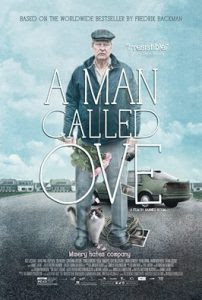





Published on April 17, 2017 10:29
‘Gifted’ shows us the path to balance
“Gifted” (2017). Cast: Chris Evans, McKenna Grace, Lindsay Duncan, Jenny Slate, Octavia Spencer, John M. Jackson, Glenn Plummer, John Finn, Elizabeth Marvel, Jon Sklaroff, Michael Randall Kaplan, Keir O’Donnell, Joe Chrest, Kelly Collins Lintz. Director: Marc Webb. Screenplay: Tom Flynn. Web site. Trailer.
What does it mean to be a kid? That can be a precarious proposition, especially these days. But what happens when you’re a child with special talents, such as phenomenal intelligence or extreme aptitude for a particular skill or ability? That can complicate matters even further, especially when you’re caught up between competing forces that each contend they have “your” best interests at heart. Those are the dynamics at work in the thoughtful new family saga, “Gifted.”
Seven-year-old Mary Adler (McKenna Grace) is a whiz at math. In fact, she’s a prodigy capable of solving complex calculations far beyond her years. But she’s also a kid, and a somewhat isolated one at that. Having been orphaned at 18 months when her mother, Diane – also an arithmetic genius – committed suicide, Mary has been under the loving but unofficial care of her uncle, Frank (Chris Evans), a former professor who left academia behind and now repairs boats for a living. Frank recognizes his niece’s capabilities and doesn’t hesitate to encourage them. But he also wants Mary to be able to experience the joys of childhood, something his brilliant but lonely sister missed out on during her upbringing. And so, after years of home tutoring and little contact with peers her own age, Frank decides it’s now time to enroll Mary in the local grade school, a decision she rails against.
 Seven-year-old Mary Adler (McKenna Grace) is a math prodigy, but she’s also a kid struggling to be allowed to be one, as seen in the engaging new family saga, “Gifted.” Photo by Wilson Webb, courtesy © Twentieth Century Fox Film Corporation.
Seven-year-old Mary Adler (McKenna Grace) is a math prodigy, but she’s also a kid struggling to be allowed to be one, as seen in the engaging new family saga, “Gifted.” Photo by Wilson Webb, courtesy © Twentieth Century Fox Film Corporation.
Mary quickly grows bored by the lack of challenge in her studies. She frequently acts out, much to the consternation of her teacher, Bonnie Stevenson (Jenny Slate). But Bonnie soon recognizes Mary’s abilities, and, with the backing of the school’s principal, Gloria Davis (Elizabeth Marvel), she encourages Frank to place his niece in a special educational facility for gifted children, a decision he rails against. He believes that enrolling Mary in such a school would isolate her even more, keeping her from making “normal” friends and developing necessary social skills, capabilities his sister never mastered when she attended a similar institution. However, before long, Frank’s decision gets challenged – and from what might seem an unlikely source.
Upon arrival home from school one day, Frank and Mary are met at their doorstep by Evelyn (Lindsay Duncan), Frank’s mother and Mary’s grandmother, someone the youngster has no recollection of ever meeting. Having once been an overbearing stage mother of sorts toward her late daughter, Evelyn aggressively tried to mold Diane’s intellectual prowess, forever keeping her focused on her studies to the detriment of her social development. And now that she sees the same talents emerging in her granddaughter, she wants a second bite at the apple at creating a mathematical wunderkind.
Frank, who has himself been estranged from Evelyn for years, is angered by her plan and vows to raise Mary the way he believes his sister would have wanted her to be brought up. But Evelyn sees her son’s decision as one that would hold back Mary’s potential, and she decides to challenge Frank in court. Since Frank has no official standing as Mary’s legally designated guardian, Evelyn believes she has a strong case to sue her son for custody, a claim made possible by her considerable wealth and fought by her high-priced lawyer, Aubrey Highsmith (John Finn). However, Frank refuses to back down, and so, with the assistance of his impassioned attorney, Greg Cullen (Glenn Plummer), and the moral support of Bonnie and his feisty neighbor, Roberta (Octavia Spencer), Mary’s best friend, he matches wits with his mother in hopes of giving Mary what she needs to grow up fulfilled and, above all, happy.
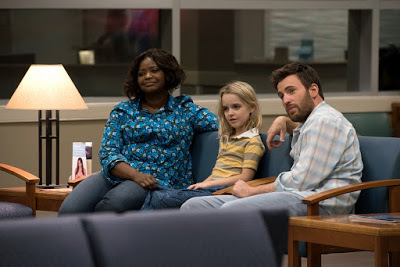 Mary Adler (McKenna Grace, center) relishes the support and comfort she receives to be herself provided by her uncle, Frank (Chris Evans, right), and best friend, Roberta (Octavia Spencer, left), in director Marc Webb’s latest offering, “Gifted.” Photo by Wilson Webb, courtesy © Twentieth Century Fox Film Corporation.
Mary Adler (McKenna Grace, center) relishes the support and comfort she receives to be herself provided by her uncle, Frank (Chris Evans, right), and best friend, Roberta (Octavia Spencer, left), in director Marc Webb’s latest offering, “Gifted.” Photo by Wilson Webb, courtesy © Twentieth Century Fox Film Corporation.
As life experiences go, Mary’s is quite unusual. On the one hand, she’s a prodigy, which distinguishes her from many of her peers, one of those children many adults go out of their way to accommodate in helping them fulfill their potential. But, on the other hand, she’s still a kid, someone who’s developing the essential interpersonal and social skills she’ll carry with her into adulthood. And, by all rights, she should also be able to experience the joys of growing up, something wunderkinder are often denied at the expense of their academic development. It’s quite a conundrum, to be sure.
So what is Mary to do? Should she forsake the foolish ways of childhood to fulfill her intellectual destiny? Or should she apply the academic brakes and allow herself to experience the joys of a normal way of life? That’s the choice and challenge posed here, and, based on the escalating circumstances involved, a solution is needed, one that satisfies both Mary and those who care about her. And that’s where the conscious creation process – the means by which we manifest the reality we experience through the power of our thoughts, beliefs and intents – can prove particularly useful.
By creating an existence as a youthful genius, Mary has pushed the envelope of her materialization skills. She’s succeeded at manifesting an intellectual capacity that exceeds many typically accepted limitations, especially for someone her age. And, to live up to her potential in this area, she’s attracted influences and individuals into her life to help her with this, such as her teacher, her principal and, most notably, her grandmother.
But, despite her scholarly achievements, the question remains, will she be able to successfully ingratiate herself into a society from which she’s already set herself apart from others in so many significant ways? If she hopes to fit in, she also needs to attract individuals and influences that will help her attain that goal. Fortunately, that’s where Frank, Roberta and Bonnie come into play.
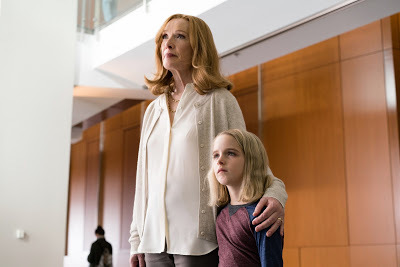 Seven-year-old math whiz Mary Adler (McKenna Grace, right) wrestles with the controlling influence of her overbearing grandmother, Evelyn (Lindsay Duncan, left), in “Gifted.” Photo by Wilson Webb, courtesy © Twentieth Century Fox Film Corporation.
Seven-year-old math whiz Mary Adler (McKenna Grace, right) wrestles with the controlling influence of her overbearing grandmother, Evelyn (Lindsay Duncan, left), in “Gifted.” Photo by Wilson Webb, courtesy © Twentieth Century Fox Film Corporation.
However, with so many people claiming they have Mary’s best interests at heart, they’ve effectively begun competing with one another over her, something that’s far from suiting her well-being. And that’s where Mary’s conscious creation skills will prove particularly crucial in helping her establish what she needs most in her life – balance.
Striking the right balance in a child’s intellectual and social development can be tricky, even under the best of circumstances. And, when conditions like those Mary faces get thrown into the mix, the situation can become incredibly complicated and exceedingly trying. The possibility of long-term damage in such scenarios is very real, with potentially devastating consequences lurking in the shadows. With opponents each claiming that they know what’s in the child’s best interests, the allegedly well-intentioned combatants could easily end up doing more harm than good. Is that what it means to be a dutiful guardian? That’s something all parties concerned need to step back and consider before proceeding with their plans to “fix” things, as Mary’s situation clearly illustrates.
To strike that balance, Mary and her aspiring caretakers need to employ a valuable conscious creation skill – discernment. This involves all concerned sorting through their respective beliefs to see that Mary’s best interests are truly met. This may not be as easy as hoped for, though, especially when desired outcomes (and the beliefs supporting them) conflict.
This potential dilemma thus places the spotlight on another conscious creation principle – the concept of co-creation. This occurs when we pool our manifestation efforts to achieve a particular result. In this case, the objective is seeing to Mary’s well-being, and each participant in this scenario has a contribution to make, even those that may be at odds with one another. In some ways, such clashes may seem counterproductive. But, in many cases, they play an integral role in working out belief contradictions that account for inherent glitches in our manifestation efforts, a resolution process that’s essential to arriving at a mutually satisfying conclusion.
The key in this, of course, is cooperation, never losing sight of the intended outcome. This may mean some of us need to let go of certain hoped-for manifestations that don’t mesh with the sought-after result. For instance, if we desperately cling to realizing a particular materialization that clearly doesn’t jibe with the rest of the scenario, it might need to jettisoned. But can someone who’s zealously clutching the element up for elimination realistically do so? Obviously such stubbornness can disrupt – perhaps even stall – the co-creation process, leading to a stalemate and possibly delaying or preventing the creation of the outcome.
To counteract impasses like this, the entrenched parties should consider heeding a piece of advice that often serves the conscious creation process well – don’t push the Universe. When we hold onto an expectation for dear life, despite compelling evidence showing us we should clearly abandon it, we may unwittingly end up trying to force our divine collaborative partner down a path we’re not supposed to pursue. It could lead to a distorted result. It could prevent us from experiencing a fortuitous synchronicity designed to make the ideal outcome occur. Or it might even lead to all kinds of unwanted frustration. Under such circumstances, it would behoove us to take a realistic look at what’s materialized and assess the underlying beliefs that brought it into being. And, after a careful, thorough analysis, we may very well find that we need to regroup, plan a new strategy and rewrite our manifesting beliefs accordingly. That might not be easy, but, in the interests of a desired outcome – one that suits the needs of everyone involved in the co-creation – that could be just what’s needed to make things work.
Such situations often provide us with valuable learning opportunities, life lessons that serve our personal growth and development as proficient conscious creators. For instance, considering how Diane’s life turned out, Evelyn should probably ask herself if she really wants to pursue the same course of action where Mary is concerned. Is that path truly in her granddaughter’s best interests? If not, would it be wise for her to push the Universe in a comparable direction once again?
Those who would adhere to such ill-conceived tactics, despite evidence to the contrary, need to realize from a conscious creation standpoint that the Universe always leans in our direction, even if it doesn’t always seem that way. This is where the value of faith comes into play. If we sincerely believe in conscious creation’s validity and recognize that the beliefs we employ for manifestation purposes will ultimately take us where we’re destined to go, we should place our trust in the philosophy and its principles. Should we do that, we’re far less likely to be disappointed than by forcing an issue that shouldn’t be forced.
 Grade school teacher Bonnie Stevenson (Jenny Slate) seeks the best for a child prodigy in her class in director Marc Webb’s “Gifted.” Photo by Wilson Webb, courtesy © Twentieth Century Fox Film Corporation.
Grade school teacher Bonnie Stevenson (Jenny Slate) seeks the best for a child prodigy in her class in director Marc Webb’s “Gifted.” Photo by Wilson Webb, courtesy © Twentieth Century Fox Film Corporation.
When we succeed at what we’re trying to achieve, we often stand to reap results that benefit both us and others, a concept conscious creators refer to as value fulfillment. In many respects, this shows us that the process is operating optimally and that we’re spot on when it comes to our manifesting beliefs. This becomes apparent with all of the characters in this story as they work toward a solution that’s in Mary’s best interests, one that not only benefits her personal growth, but also her development as a prodigy capable of bringing forth mathematical discoveries that contribute to the emergence of her academic prowess and to the well-being of society at large. That’s truly the best of all worlds and something that all concerned should be able to agree on as being in everyone’s best interests.
Despite some moments of predictability and a handful of underdeveloped elements, director Marc Webb’s delightful, crowd-pleasing family saga otherwise delivers the goods, especially when it comes to hearty laughs and deservedly earned heartfelt reactions. The generally crisp, insightful script, coupled with terrific performances across the board by a great cast (particularly Grace and Duncan), make for a winning combination that readily satisfies, one that draws its inspiration from such offerings as “Kramer vs. Kramer” (1979) and “Little Man Tate” (1991). In short, “Gifted” is easily one of the best releases to come out in an otherwise-disappointing 2017 movie season thus far.
When considering a youngster’s welfare, those seeking to achieve that end truly need to look at the child first and their own aspirations second. Undue harm can be inflicted – unwittingly or otherwise – if the child’s well-bring gets short shrift at the expense of adult egos and contentious claims. The gifted truly need to be allowed to let their talents flourish, but they also need to be allowed to be kids, and, if we want them to grow up right, we’d better not lose sight of that.
Copyright © 2017, by Brent Marchant. All rights reserved.
What does it mean to be a kid? That can be a precarious proposition, especially these days. But what happens when you’re a child with special talents, such as phenomenal intelligence or extreme aptitude for a particular skill or ability? That can complicate matters even further, especially when you’re caught up between competing forces that each contend they have “your” best interests at heart. Those are the dynamics at work in the thoughtful new family saga, “Gifted.”
Seven-year-old Mary Adler (McKenna Grace) is a whiz at math. In fact, she’s a prodigy capable of solving complex calculations far beyond her years. But she’s also a kid, and a somewhat isolated one at that. Having been orphaned at 18 months when her mother, Diane – also an arithmetic genius – committed suicide, Mary has been under the loving but unofficial care of her uncle, Frank (Chris Evans), a former professor who left academia behind and now repairs boats for a living. Frank recognizes his niece’s capabilities and doesn’t hesitate to encourage them. But he also wants Mary to be able to experience the joys of childhood, something his brilliant but lonely sister missed out on during her upbringing. And so, after years of home tutoring and little contact with peers her own age, Frank decides it’s now time to enroll Mary in the local grade school, a decision she rails against.
 Seven-year-old Mary Adler (McKenna Grace) is a math prodigy, but she’s also a kid struggling to be allowed to be one, as seen in the engaging new family saga, “Gifted.” Photo by Wilson Webb, courtesy © Twentieth Century Fox Film Corporation.
Seven-year-old Mary Adler (McKenna Grace) is a math prodigy, but she’s also a kid struggling to be allowed to be one, as seen in the engaging new family saga, “Gifted.” Photo by Wilson Webb, courtesy © Twentieth Century Fox Film Corporation.Mary quickly grows bored by the lack of challenge in her studies. She frequently acts out, much to the consternation of her teacher, Bonnie Stevenson (Jenny Slate). But Bonnie soon recognizes Mary’s abilities, and, with the backing of the school’s principal, Gloria Davis (Elizabeth Marvel), she encourages Frank to place his niece in a special educational facility for gifted children, a decision he rails against. He believes that enrolling Mary in such a school would isolate her even more, keeping her from making “normal” friends and developing necessary social skills, capabilities his sister never mastered when she attended a similar institution. However, before long, Frank’s decision gets challenged – and from what might seem an unlikely source.
Upon arrival home from school one day, Frank and Mary are met at their doorstep by Evelyn (Lindsay Duncan), Frank’s mother and Mary’s grandmother, someone the youngster has no recollection of ever meeting. Having once been an overbearing stage mother of sorts toward her late daughter, Evelyn aggressively tried to mold Diane’s intellectual prowess, forever keeping her focused on her studies to the detriment of her social development. And now that she sees the same talents emerging in her granddaughter, she wants a second bite at the apple at creating a mathematical wunderkind.
Frank, who has himself been estranged from Evelyn for years, is angered by her plan and vows to raise Mary the way he believes his sister would have wanted her to be brought up. But Evelyn sees her son’s decision as one that would hold back Mary’s potential, and she decides to challenge Frank in court. Since Frank has no official standing as Mary’s legally designated guardian, Evelyn believes she has a strong case to sue her son for custody, a claim made possible by her considerable wealth and fought by her high-priced lawyer, Aubrey Highsmith (John Finn). However, Frank refuses to back down, and so, with the assistance of his impassioned attorney, Greg Cullen (Glenn Plummer), and the moral support of Bonnie and his feisty neighbor, Roberta (Octavia Spencer), Mary’s best friend, he matches wits with his mother in hopes of giving Mary what she needs to grow up fulfilled and, above all, happy.
 Mary Adler (McKenna Grace, center) relishes the support and comfort she receives to be herself provided by her uncle, Frank (Chris Evans, right), and best friend, Roberta (Octavia Spencer, left), in director Marc Webb’s latest offering, “Gifted.” Photo by Wilson Webb, courtesy © Twentieth Century Fox Film Corporation.
Mary Adler (McKenna Grace, center) relishes the support and comfort she receives to be herself provided by her uncle, Frank (Chris Evans, right), and best friend, Roberta (Octavia Spencer, left), in director Marc Webb’s latest offering, “Gifted.” Photo by Wilson Webb, courtesy © Twentieth Century Fox Film Corporation.As life experiences go, Mary’s is quite unusual. On the one hand, she’s a prodigy, which distinguishes her from many of her peers, one of those children many adults go out of their way to accommodate in helping them fulfill their potential. But, on the other hand, she’s still a kid, someone who’s developing the essential interpersonal and social skills she’ll carry with her into adulthood. And, by all rights, she should also be able to experience the joys of growing up, something wunderkinder are often denied at the expense of their academic development. It’s quite a conundrum, to be sure.
So what is Mary to do? Should she forsake the foolish ways of childhood to fulfill her intellectual destiny? Or should she apply the academic brakes and allow herself to experience the joys of a normal way of life? That’s the choice and challenge posed here, and, based on the escalating circumstances involved, a solution is needed, one that satisfies both Mary and those who care about her. And that’s where the conscious creation process – the means by which we manifest the reality we experience through the power of our thoughts, beliefs and intents – can prove particularly useful.
By creating an existence as a youthful genius, Mary has pushed the envelope of her materialization skills. She’s succeeded at manifesting an intellectual capacity that exceeds many typically accepted limitations, especially for someone her age. And, to live up to her potential in this area, she’s attracted influences and individuals into her life to help her with this, such as her teacher, her principal and, most notably, her grandmother.
But, despite her scholarly achievements, the question remains, will she be able to successfully ingratiate herself into a society from which she’s already set herself apart from others in so many significant ways? If she hopes to fit in, she also needs to attract individuals and influences that will help her attain that goal. Fortunately, that’s where Frank, Roberta and Bonnie come into play.
 Seven-year-old math whiz Mary Adler (McKenna Grace, right) wrestles with the controlling influence of her overbearing grandmother, Evelyn (Lindsay Duncan, left), in “Gifted.” Photo by Wilson Webb, courtesy © Twentieth Century Fox Film Corporation.
Seven-year-old math whiz Mary Adler (McKenna Grace, right) wrestles with the controlling influence of her overbearing grandmother, Evelyn (Lindsay Duncan, left), in “Gifted.” Photo by Wilson Webb, courtesy © Twentieth Century Fox Film Corporation.However, with so many people claiming they have Mary’s best interests at heart, they’ve effectively begun competing with one another over her, something that’s far from suiting her well-being. And that’s where Mary’s conscious creation skills will prove particularly crucial in helping her establish what she needs most in her life – balance.
Striking the right balance in a child’s intellectual and social development can be tricky, even under the best of circumstances. And, when conditions like those Mary faces get thrown into the mix, the situation can become incredibly complicated and exceedingly trying. The possibility of long-term damage in such scenarios is very real, with potentially devastating consequences lurking in the shadows. With opponents each claiming that they know what’s in the child’s best interests, the allegedly well-intentioned combatants could easily end up doing more harm than good. Is that what it means to be a dutiful guardian? That’s something all parties concerned need to step back and consider before proceeding with their plans to “fix” things, as Mary’s situation clearly illustrates.
To strike that balance, Mary and her aspiring caretakers need to employ a valuable conscious creation skill – discernment. This involves all concerned sorting through their respective beliefs to see that Mary’s best interests are truly met. This may not be as easy as hoped for, though, especially when desired outcomes (and the beliefs supporting them) conflict.
This potential dilemma thus places the spotlight on another conscious creation principle – the concept of co-creation. This occurs when we pool our manifestation efforts to achieve a particular result. In this case, the objective is seeing to Mary’s well-being, and each participant in this scenario has a contribution to make, even those that may be at odds with one another. In some ways, such clashes may seem counterproductive. But, in many cases, they play an integral role in working out belief contradictions that account for inherent glitches in our manifestation efforts, a resolution process that’s essential to arriving at a mutually satisfying conclusion.
The key in this, of course, is cooperation, never losing sight of the intended outcome. This may mean some of us need to let go of certain hoped-for manifestations that don’t mesh with the sought-after result. For instance, if we desperately cling to realizing a particular materialization that clearly doesn’t jibe with the rest of the scenario, it might need to jettisoned. But can someone who’s zealously clutching the element up for elimination realistically do so? Obviously such stubbornness can disrupt – perhaps even stall – the co-creation process, leading to a stalemate and possibly delaying or preventing the creation of the outcome.
To counteract impasses like this, the entrenched parties should consider heeding a piece of advice that often serves the conscious creation process well – don’t push the Universe. When we hold onto an expectation for dear life, despite compelling evidence showing us we should clearly abandon it, we may unwittingly end up trying to force our divine collaborative partner down a path we’re not supposed to pursue. It could lead to a distorted result. It could prevent us from experiencing a fortuitous synchronicity designed to make the ideal outcome occur. Or it might even lead to all kinds of unwanted frustration. Under such circumstances, it would behoove us to take a realistic look at what’s materialized and assess the underlying beliefs that brought it into being. And, after a careful, thorough analysis, we may very well find that we need to regroup, plan a new strategy and rewrite our manifesting beliefs accordingly. That might not be easy, but, in the interests of a desired outcome – one that suits the needs of everyone involved in the co-creation – that could be just what’s needed to make things work.
Such situations often provide us with valuable learning opportunities, life lessons that serve our personal growth and development as proficient conscious creators. For instance, considering how Diane’s life turned out, Evelyn should probably ask herself if she really wants to pursue the same course of action where Mary is concerned. Is that path truly in her granddaughter’s best interests? If not, would it be wise for her to push the Universe in a comparable direction once again?
Those who would adhere to such ill-conceived tactics, despite evidence to the contrary, need to realize from a conscious creation standpoint that the Universe always leans in our direction, even if it doesn’t always seem that way. This is where the value of faith comes into play. If we sincerely believe in conscious creation’s validity and recognize that the beliefs we employ for manifestation purposes will ultimately take us where we’re destined to go, we should place our trust in the philosophy and its principles. Should we do that, we’re far less likely to be disappointed than by forcing an issue that shouldn’t be forced.
 Grade school teacher Bonnie Stevenson (Jenny Slate) seeks the best for a child prodigy in her class in director Marc Webb’s “Gifted.” Photo by Wilson Webb, courtesy © Twentieth Century Fox Film Corporation.
Grade school teacher Bonnie Stevenson (Jenny Slate) seeks the best for a child prodigy in her class in director Marc Webb’s “Gifted.” Photo by Wilson Webb, courtesy © Twentieth Century Fox Film Corporation.When we succeed at what we’re trying to achieve, we often stand to reap results that benefit both us and others, a concept conscious creators refer to as value fulfillment. In many respects, this shows us that the process is operating optimally and that we’re spot on when it comes to our manifesting beliefs. This becomes apparent with all of the characters in this story as they work toward a solution that’s in Mary’s best interests, one that not only benefits her personal growth, but also her development as a prodigy capable of bringing forth mathematical discoveries that contribute to the emergence of her academic prowess and to the well-being of society at large. That’s truly the best of all worlds and something that all concerned should be able to agree on as being in everyone’s best interests.
Despite some moments of predictability and a handful of underdeveloped elements, director Marc Webb’s delightful, crowd-pleasing family saga otherwise delivers the goods, especially when it comes to hearty laughs and deservedly earned heartfelt reactions. The generally crisp, insightful script, coupled with terrific performances across the board by a great cast (particularly Grace and Duncan), make for a winning combination that readily satisfies, one that draws its inspiration from such offerings as “Kramer vs. Kramer” (1979) and “Little Man Tate” (1991). In short, “Gifted” is easily one of the best releases to come out in an otherwise-disappointing 2017 movie season thus far.
When considering a youngster’s welfare, those seeking to achieve that end truly need to look at the child first and their own aspirations second. Undue harm can be inflicted – unwittingly or otherwise – if the child’s well-bring gets short shrift at the expense of adult egos and contentious claims. The gifted truly need to be allowed to let their talents flourish, but they also need to be allowed to be kids, and, if we want them to grow up right, we’d better not lose sight of that.
Copyright © 2017, by Brent Marchant. All rights reserved.
Published on April 17, 2017 02:33
April 12, 2017
‘The Zookeeper’s Wife’ profiles courage in action
“The Zookeeper’s Wife” (2017). Cast: Jessica Chastain, Johan Heldenbergh, Daniel Brühl, Timothy Radford, Val Maloku, Efrat Dor, Iddo Goldberg, Shira Haas, Michael McElhatton. Director: Niki Caro. Screenplay: Angela Workman, Book: Diane Ackerman, The Zookeeper’s Wife. Web site. Trailer.
If you had the means to protect the persecuted from a horrific fate, would you be willing to provide it? If so, how far would you go with it? Would you proceed even if your own safety were at stake? Those are difficult questions and even more difficult choices. But, for a courageous husband and wife team, there was no question about what to do, as seen in the new, fact-based historical drama, “The Zookeeper’s Wife.”
In Warsaw, Poland in 1939, Antonina Zabinski (Jessica Chastain) and her husband, Jan (Johan Heldenbergh), run the city’s zoological garden, a beautiful and popular attraction among the locals. The Zabinskis warmly welcome visitors and lovingly care for their animals, especially Antonina, who dotes on the creatures as if they were her own children. They also readily share their experiences with visiting dignitaries, such as Lutz Heck (Daniel Brühl), chief zoologist at the Berlin zoo.
But then comes September 1, 1939, the start of German Chancellor Adolph Hitler’s blitzkrieg, the Nazis’ brutal, lightning-fast assault on Poland that quickly leads to the country being overrun, the event that marks the start of World War II. In the midst of the melee, the zoo is virtually bombed out of existence, with many of its facilities destroyed and many of its animals killed or let loose into the streets of Warsaw. Somehow, Antonina, Jan and their son, Ryszard (Timothy Radford), manage to survive relatively unscathed. But the facility the Zabinskis have spent their lives developing is left in a shambles. And, to add insult to injury, German forces take over what’s left of the zoo to use it for a staging area under the direction of their commanding officer, Lutz Heck, now a high-ranking Nazi official.
Given the relationship Antonina and Jan have cultivated with Heck, as a fellow zookeeper, the German commander is surprisingly accommodating to their circumstances. For example, he agrees to spare the zoo’s best specimens by moving them to his facility in Berlin. But, at heart, Heck is still part of the invading German force and places his country’s interests first, including those of a zoological nature.
As the occupation of Warsaw proceeds, the Nazis’ plan to round up the city’s Jewish population begins. They are confined in the Warsaw ghetto and largely refused access to other parts of the city. Antonina and Jan, who have a number of Jewish friends, such as Magda (Efrat Dor) and Maurycy (Iddo Goldberg), are quietly appalled by the development and wonder if there is anything they can do to help. It soon dawns on them that they have an extensive basement complex underneath their home, one that connects to the zoo’s facilities via a series of tunnels – an ideal place to hide the persecuted.
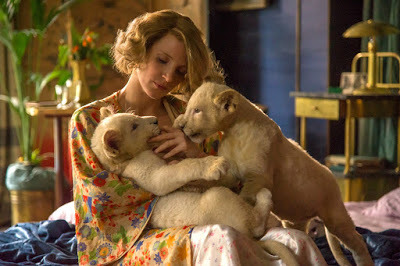 Antonina Zabinski (Jessica Chastain), co-owner of the Warsaw zoo, loves animals almost as much as she loves people, a trait amply illustrated in the new, fact-based historical drama, “The Zookeeper’s Wife.” Photo by Ann Marie Fox, courtesy of Focus Features.
Antonina Zabinski (Jessica Chastain), co-owner of the Warsaw zoo, loves animals almost as much as she loves people, a trait amply illustrated in the new, fact-based historical drama, “The Zookeeper’s Wife.” Photo by Ann Marie Fox, courtesy of Focus Features.
Antonina and Jan concoct a ruse to convert the zoo into a pig farm, a source of readily available foodstuffs for hungry German soldiers. They propose that the swine be fed with food scraps collected from trash heaps in the ghetto, material that can be loaded into the large storage compartment of their truck, one that’s handily big enough to transport concealed refugees out of their confinement and into the safety of the zookeepers’ basement. Believing that Heck sees them as friends, they pitch the proposal to him, and he readily agrees. It’s a decision that effectively green-lights the Zabinskis’ plan, one that would inevitably save the lives of hundreds of Jews who would have otherwise met an unspeakable end in Nazi concentration camps.
Ideally, no one – neither protector nor victim – should have to contend with the kinds of circumstances that the citizens of Warsaw went through during World War II. But, when confronted with such conditions, our resourcefulness for survival gets put to the test. And it’s at times like that when our conscious creation skills invariably prove more useful than ever. As the process behind which we employ our thoughts, beliefs and intents to create the reality we experience, our aptitude for it may very well mean the difference between life and death.
Extraordinary challenges call for extraordinary responses, and that’s what heroic figures like the Zabinskis put to use to help save the lives of hundreds. Accomplishing this requires us to push the limits of what we’re able to envision, to come up with solutions that go beyond traditional tried-and-true measures, and to develop and employ beliefs that make such scenarios possible. And, considering the plan that Antonina and Jan devised, they certainly succeeded on those points.
Given the tremendous pressures placed on the Polish people by the invading Germans, including those who weren’t part of the local Jewish population, one might wonder what would prompt someone to stick out his or her neck and risk the potentially severe retribution that would inevitably come from an activity as perilous as intentionally hiding enemies of the state. Some might see this as an almost suicidal path.
But, given the Zabinskis’ character, their actions were right in line with their nature. When one witnesses the kind of loving compassion they show toward their zoo’s animals, as seen early on in Antonina’s handling of a mother elephant in distress over her baby’s failing health, it’s no wonder that the couple would do the same when it came to aiding their fellow human beings. Their conduct was a direct reflection of their beliefs brought to life, a force so strong that it was virtually unstoppable, no matter what the odds.
This heroic behavior clearly illustrates one of conscious creation’s key concepts, that of conquering our fears and living courageously to bring our most heartfelt manifestations into being. Their example is especially inspiring in light of the conditions under which they operated. If they can accomplish what they did under those circumstances, anything short of that should be easy by comparison.
 Antonina Zabinski (Jessica Chastain, right) and her husband, Jan (Johan Heldenbergh, left), co-owners of the Warsaw zoo, devise an inspired plan to help protect members of the city’s Jewish population at the start of World War II in director Niki Caro’s latest offering, “The Zookeeper’s Wife.” Photo by Ann Marie Fox, courtesy of Focus Features.
Antonina Zabinski (Jessica Chastain, right) and her husband, Jan (Johan Heldenbergh, left), co-owners of the Warsaw zoo, devise an inspired plan to help protect members of the city’s Jewish population at the start of World War II in director Niki Caro’s latest offering, “The Zookeeper’s Wife.” Photo by Ann Marie Fox, courtesy of Focus Features.
“The Zookeeper’s Wife” clearly demonstrates what it means to be selfless and heroic. Through their efforts, the Zabinskis managed to spare the lives of many of Warsaw’s persecuted. And they did so under considerable duress, with their own safety – and even the sanctity of their marriage – often at risk. But, when it came to doing the right thing, they never hesitated to stick to their convictions and follow through on their plans.
Director Niki Caro’s inspiring tale of a courage is reminiscent of “Schindler’s List” (1993) but in a uniquely different setting. The film features an excellent lead performance by Chastain, gorgeous cinematography and a moving, heroic narrative. It’s the kind of movie that truly compels us to take a stand when one needs to be taken.
However, given the film’s subject matter, it unfortunately also feels a bit “sanitized” at times, with some of the action looking as though it’s taking place on a movie set and not in the kind of real-world conditions that existed at the time. In all likelihood this was done to make the movie more appealing to a wider, more commercial audience, but this approach sometimes rings a little hollow in light of the story. While a gratuitous take undoubtedly would have been inappropriate, the film nevertheless probably would have benefitted from a somewhat grittier edge to make it feel a little more authentic.
Hard choices are difficult to face and even more challenging to address. But, when we consider what’s at stake, sometimes we may feel as though we have no choice but to act. That’s what it means to be a hero, and the Zabinskis truly epitomize that ideal. May we all draw from their inspiration when we come up against challenges of our own.
Copyright © 2017, by Brent Marchant. All rights reserved.
If you had the means to protect the persecuted from a horrific fate, would you be willing to provide it? If so, how far would you go with it? Would you proceed even if your own safety were at stake? Those are difficult questions and even more difficult choices. But, for a courageous husband and wife team, there was no question about what to do, as seen in the new, fact-based historical drama, “The Zookeeper’s Wife.”
In Warsaw, Poland in 1939, Antonina Zabinski (Jessica Chastain) and her husband, Jan (Johan Heldenbergh), run the city’s zoological garden, a beautiful and popular attraction among the locals. The Zabinskis warmly welcome visitors and lovingly care for their animals, especially Antonina, who dotes on the creatures as if they were her own children. They also readily share their experiences with visiting dignitaries, such as Lutz Heck (Daniel Brühl), chief zoologist at the Berlin zoo.
But then comes September 1, 1939, the start of German Chancellor Adolph Hitler’s blitzkrieg, the Nazis’ brutal, lightning-fast assault on Poland that quickly leads to the country being overrun, the event that marks the start of World War II. In the midst of the melee, the zoo is virtually bombed out of existence, with many of its facilities destroyed and many of its animals killed or let loose into the streets of Warsaw. Somehow, Antonina, Jan and their son, Ryszard (Timothy Radford), manage to survive relatively unscathed. But the facility the Zabinskis have spent their lives developing is left in a shambles. And, to add insult to injury, German forces take over what’s left of the zoo to use it for a staging area under the direction of their commanding officer, Lutz Heck, now a high-ranking Nazi official.
Given the relationship Antonina and Jan have cultivated with Heck, as a fellow zookeeper, the German commander is surprisingly accommodating to their circumstances. For example, he agrees to spare the zoo’s best specimens by moving them to his facility in Berlin. But, at heart, Heck is still part of the invading German force and places his country’s interests first, including those of a zoological nature.
As the occupation of Warsaw proceeds, the Nazis’ plan to round up the city’s Jewish population begins. They are confined in the Warsaw ghetto and largely refused access to other parts of the city. Antonina and Jan, who have a number of Jewish friends, such as Magda (Efrat Dor) and Maurycy (Iddo Goldberg), are quietly appalled by the development and wonder if there is anything they can do to help. It soon dawns on them that they have an extensive basement complex underneath their home, one that connects to the zoo’s facilities via a series of tunnels – an ideal place to hide the persecuted.
 Antonina Zabinski (Jessica Chastain), co-owner of the Warsaw zoo, loves animals almost as much as she loves people, a trait amply illustrated in the new, fact-based historical drama, “The Zookeeper’s Wife.” Photo by Ann Marie Fox, courtesy of Focus Features.
Antonina Zabinski (Jessica Chastain), co-owner of the Warsaw zoo, loves animals almost as much as she loves people, a trait amply illustrated in the new, fact-based historical drama, “The Zookeeper’s Wife.” Photo by Ann Marie Fox, courtesy of Focus Features.Antonina and Jan concoct a ruse to convert the zoo into a pig farm, a source of readily available foodstuffs for hungry German soldiers. They propose that the swine be fed with food scraps collected from trash heaps in the ghetto, material that can be loaded into the large storage compartment of their truck, one that’s handily big enough to transport concealed refugees out of their confinement and into the safety of the zookeepers’ basement. Believing that Heck sees them as friends, they pitch the proposal to him, and he readily agrees. It’s a decision that effectively green-lights the Zabinskis’ plan, one that would inevitably save the lives of hundreds of Jews who would have otherwise met an unspeakable end in Nazi concentration camps.
Ideally, no one – neither protector nor victim – should have to contend with the kinds of circumstances that the citizens of Warsaw went through during World War II. But, when confronted with such conditions, our resourcefulness for survival gets put to the test. And it’s at times like that when our conscious creation skills invariably prove more useful than ever. As the process behind which we employ our thoughts, beliefs and intents to create the reality we experience, our aptitude for it may very well mean the difference between life and death.
Extraordinary challenges call for extraordinary responses, and that’s what heroic figures like the Zabinskis put to use to help save the lives of hundreds. Accomplishing this requires us to push the limits of what we’re able to envision, to come up with solutions that go beyond traditional tried-and-true measures, and to develop and employ beliefs that make such scenarios possible. And, considering the plan that Antonina and Jan devised, they certainly succeeded on those points.
Given the tremendous pressures placed on the Polish people by the invading Germans, including those who weren’t part of the local Jewish population, one might wonder what would prompt someone to stick out his or her neck and risk the potentially severe retribution that would inevitably come from an activity as perilous as intentionally hiding enemies of the state. Some might see this as an almost suicidal path.
But, given the Zabinskis’ character, their actions were right in line with their nature. When one witnesses the kind of loving compassion they show toward their zoo’s animals, as seen early on in Antonina’s handling of a mother elephant in distress over her baby’s failing health, it’s no wonder that the couple would do the same when it came to aiding their fellow human beings. Their conduct was a direct reflection of their beliefs brought to life, a force so strong that it was virtually unstoppable, no matter what the odds.
This heroic behavior clearly illustrates one of conscious creation’s key concepts, that of conquering our fears and living courageously to bring our most heartfelt manifestations into being. Their example is especially inspiring in light of the conditions under which they operated. If they can accomplish what they did under those circumstances, anything short of that should be easy by comparison.
 Antonina Zabinski (Jessica Chastain, right) and her husband, Jan (Johan Heldenbergh, left), co-owners of the Warsaw zoo, devise an inspired plan to help protect members of the city’s Jewish population at the start of World War II in director Niki Caro’s latest offering, “The Zookeeper’s Wife.” Photo by Ann Marie Fox, courtesy of Focus Features.
Antonina Zabinski (Jessica Chastain, right) and her husband, Jan (Johan Heldenbergh, left), co-owners of the Warsaw zoo, devise an inspired plan to help protect members of the city’s Jewish population at the start of World War II in director Niki Caro’s latest offering, “The Zookeeper’s Wife.” Photo by Ann Marie Fox, courtesy of Focus Features.“The Zookeeper’s Wife” clearly demonstrates what it means to be selfless and heroic. Through their efforts, the Zabinskis managed to spare the lives of many of Warsaw’s persecuted. And they did so under considerable duress, with their own safety – and even the sanctity of their marriage – often at risk. But, when it came to doing the right thing, they never hesitated to stick to their convictions and follow through on their plans.
Director Niki Caro’s inspiring tale of a courage is reminiscent of “Schindler’s List” (1993) but in a uniquely different setting. The film features an excellent lead performance by Chastain, gorgeous cinematography and a moving, heroic narrative. It’s the kind of movie that truly compels us to take a stand when one needs to be taken.
However, given the film’s subject matter, it unfortunately also feels a bit “sanitized” at times, with some of the action looking as though it’s taking place on a movie set and not in the kind of real-world conditions that existed at the time. In all likelihood this was done to make the movie more appealing to a wider, more commercial audience, but this approach sometimes rings a little hollow in light of the story. While a gratuitous take undoubtedly would have been inappropriate, the film nevertheless probably would have benefitted from a somewhat grittier edge to make it feel a little more authentic.
Hard choices are difficult to face and even more challenging to address. But, when we consider what’s at stake, sometimes we may feel as though we have no choice but to act. That’s what it means to be a hero, and the Zabinskis truly epitomize that ideal. May we all draw from their inspiration when we come up against challenges of our own.
Copyright © 2017, by Brent Marchant. All rights reserved.
Published on April 12, 2017 00:09



